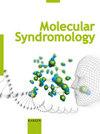两种罕见情况的共存使对方的治疗复杂化:丙酸血症和Apert综合征
IF 0.9
4区 医学
Q4 GENETICS & HEREDITY
引用次数: 0
摘要
& lt; b> & lt; i>简介:& lt; / i> & lt; / b>丙酸血症(PA)是一种常染色体隐性遗传的先天性有机酸代谢错误。新生儿发病时可能出现进食困难和呕吐;如果不及时治疗,可能会发生癫痫发作、昏迷和死亡。此外,诸如感染和外科手术等分解代谢过程可能导致代谢失代偿,因此应密切关注有机酸血症患者。& lt; b> & lt; i>案例表示:& lt; / i> & lt; / b>本文报道一例在新生儿期被诊断为PA和Apert综合征的患者,以及两者共存所引起的并发症。Apert综合征和PA共存所带来的困难使本病例独特。她在颅脑成形术和腹股沟疝修复后因代谢失代偿而长期住院,两者都是由院内呼吸道感染引发的,使Apert综合征的手术治疗和PA的治疗复杂化。& lt; b> & lt; i>结论:& lt; / i> & lt; / b>这两种严重疾病的共存要求更谨慎的临床管理,因为Apert综合征患者需要接受多次外科手术,使他们容易发生分解代谢失代偿。本文章由计算机程序翻译,如有差异,请以英文原文为准。
Coexistence of Two Rare Conditions Complicating the Other’s Management: Propionic Acidemia and Apert Syndrome
Introduction: Propionic acidemia (PA) is an inborn error of organic acid metabolism inherited in an autosomal recessive manner. The neonatal-onset disease may present with feeding difficulties and vomiting; seizures, coma, and death may occur if untreated. In addition, catabolic processes such as infections and surgical procedures could cause metabolic decompensation, so patients with organic acidemia should be followed closely. Case Presentation: Here, a patient diagnosed with PA and Apert syndrome in the neonatal period and the complications caused by the coexistence of the two entities are mentioned. The difficulties precipitated by the coexistence of Apert syndrome and PA make this case unique. She has had prolonged hospitalizations due to metabolic decompensations after cranioplasty and inguinal hernia repair, both triggered by nosocomial respiratory infections, complicating both the surgical treatment of Apert syndrome and the management of PA. Conclusion: Coexistence of these two serious disorders mandates a more prudent clinical management as Apert syndrome patients undergo several surgical procedures, rendering them susceptible to catabolic decompensations.
求助全文
通过发布文献求助,成功后即可免费获取论文全文。
去求助
来源期刊

Molecular Syndromology
Biochemistry, Genetics and Molecular Biology-Genetics
CiteScore
1.70
自引率
9.10%
发文量
67
期刊介绍:
''Molecular Syndromology'' publishes high-quality research articles, short reports and reviews on common and rare genetic syndromes, aiming to increase clinical understanding through molecular insights. Topics of particular interest are the molecular basis of genetic syndromes, genotype-phenotype correlation, natural history, strategies in disease management and novel therapeutic approaches based on molecular findings. Research on model systems is also welcome, especially when it is obviously relevant to human genetics. With high-quality reviews on current topics the journal aims to facilitate translation of research findings to a clinical setting while also stimulating further research on clinically relevant questions. The journal targets not only medical geneticists and basic biomedical researchers, but also clinicians dealing with genetic syndromes. With four Associate Editors from three continents and a broad international Editorial Board the journal welcomes submissions covering the latest research from around the world.
 求助内容:
求助内容: 应助结果提醒方式:
应助结果提醒方式:


